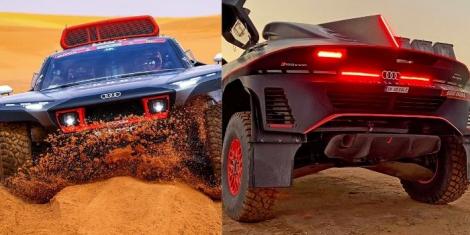
First, run in 1979, the Dakar Rally has witnessed big changes like shifts in location, from West Africa for much of its history, to South America between 2009 and 2019, and now to the Saudi Arabian desert, where the 2022 edition runs from January 2 to January 14.
It’s also at the forefront of the huge changes that are affecting the entire automotive industry these days.
Recent updates to the rules have thrown open the door for all manner of innovative electrified powertrains to be used on the grueling two-week-long race, and one of the first companies to grasp the opportunity was Audi.
When Audi first announced its intent to race the Dakar Rally with a car propelled solely by electricity, it did so under the belief that the regulations would be written in a way that ensured its RS Q e-tron would be competitive with the internal combustion engine (ICE) powered classes.
From Audi’s point of view, that meant their cars would be allowed an on-board tire inflation system to help tune the car’s handling on the fly and a physically larger chassis to allow for more suspension travel and bigger wheels in a bid to spread out impact loads and more easily cover uneven terrain.
The Dakar Rally has previously been conquered by the likes of Citroen, Mitsubishi, Peugeot and Volkswagen.
The introduction of a hybrid electric car by Audi for the Dakar Rally has proven to be a boost as Spaniard Carlos Sainz won the third stage of the Dakar Rally in Saudi Arabia on Tuesday, January 3, with his Audi team celebrating a first for an electric hybrid car.
While the name mixes elements from several Audi road cars, this is in every way a brutal and soft off-road racer.
As the e-tron part suggests, however, it differs in a key way from Dakar monsters of the past, because its wheels are turned by electric motors.
Lack of charging points in the remote Saudi desert was seen as a challenge prompting Audi charging the battery on the go using a four-cylinder petrol engine, making this the world’s wildest range-extender.
